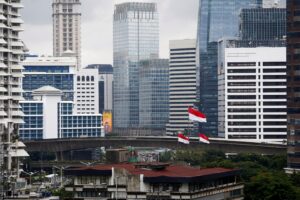JAKARTA — Indonesia’s economic growth climbed to its strongest in nine years last year fueled by revived spending from the lifting of pandemic restrictions and as a global commodity boom sent exports to a record high.
But momentum slowed in the final quarter as prices moderated, and weaker global demand, higher inflation and a rise in interest rates could pose a drag on activity this year.
Southeast Asia’s largest economy expanded 5.31% in 2022, Statistics Indonesia data showed on Monday, its best annual growth rate since 2013, and faster than the 5.29% expected in a Reuters poll.
In the fourth quarter, gross domestic product (GDP) expanded 5.01% on an annual basis, compared with 4.84% growth predicted by the poll and 5.72% in the previous three months. The annual rate was the slowest since the third quarter of 2021, the statistics agency said.
The resource-rich economy gained from high global commodities prices in the aftermath of the Russia-Ukraine war that aided the rupiah and improved the country’s current account, but global demand is faltering.
“We expect growth to slow further over the coming quarters. Exports will struggle due to weaker global growth and lower commodity prices,” Capital Economics analyst Shivaan Tandon said.
“Global commodity prices have dropped back since late last year, and we expect further falls over the coming months. Meanwhile, despite the rebound now underway in China, we expect global growth to struggle this year as the US falls into recession.”
Indonesia’s exports grew on the back of soaring commodity prices last year, with shipments reaching a record high of $292 billion. The country is a major supplier of thermal coal, palm oil and nickel steel.
STRONG CONSUMPTION
Household consumption, which accounts for more than half of Indonesia’s GDP, accelerated last year, especially supported by travel-related spending as COVID-19 restrictions eased.
Indonesia removed most movement curbs last year after daily cases dropped and vaccination rates rose, driving up household consumption. All remaining measures were lifted at the end of the year.
Investment grew 3.87% last year, similar to 2021’s growth but is yet to return to pre-pandemic levels, the statistics bureau said.
Meanwhile, government spending in 2022 contracted as Jakarta started to ease back from pandemic-era health and social spending.
This year’s growth would likely be supported by household consumption amid continued improvement in people’s mobility, Bank Mandiri economist Faisal Rachman said, predicting growth of 5.04% in 2023.
The recent tightening of monetary policy may drag on growth prospects, analysts said, although Indonesia’s central bank has signaled that its rate hike cycle was ending as inflation has cooled.
Bank Indonesia has raised its policy interest rate by 225 basis points since August. Myrdal Gunarto of Maybank Indonesia predicted that the policy rate will be kept at the current level of 5.75% until the end of 2023 to uphold growth.
Jakarta has set a target of 5.3% for economic growth in 2023. — Reuters








